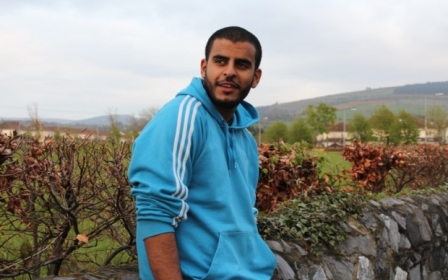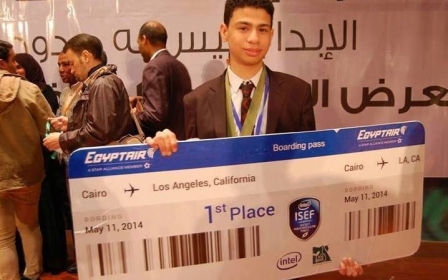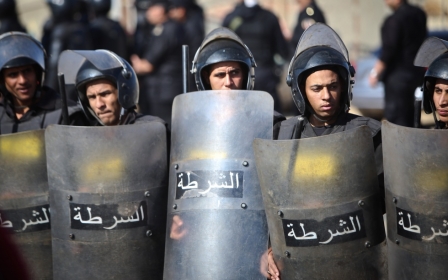Egypt's parliament rejects calls for release of Irish citizen held for 1000 days

Egypt’s parliament has rejected calls from the Irish parliament to release an Irish citizen who has been on hunger strike after 1,000 days awaiting trial.
The parliament dismissed the Dail's request for the release of Ibrahim Halawa, describing its calls as interfering in the affairs of the Egyptian judiciary.
Halawa, who was born in Ireland to Egyptian parents, was 17 when he was arrested during a siege at the Al-Fath mosque in Cairo in June 2013. He has reported suffering beatings and torture in jail.
He was on holiday with his family when he was arrested along with his sisters after seeking refuge in the mosque during protests. While his sisters were later released on bail and returned to Ireland, Ibrahim has been incarcerated for more than 1000 days without trial.
He has been accused with 400 others held during the siege of inciting violence, rioting and committing acts of sabotage.
Halawa has been on hunger strike at Wadi el-Natrun jail north of Cairo after the Egyptian courts postponed his trial for the 14th time in June.
Khadija Halawa, who visited her brother in late July, said that he was only consuming water during his hunger strike and that his blood sugar levels were dangerously low.
Gunshot wound
According to his family, Halawa did not receive treatment for a gunshot wound to his hand suffered just before he was arrested.
Reprieve said he was one of "hundreds" of juveniles who had been arrested in the same protests and still face prosecution.
"Despite the fact that Ibrahim was a juvenile when arrested, he has been held in adult prisons and is being tried by adult courts," the group said.
"Reprieve has discovered that hundreds of children – including some as young as six – were arrested in the same breakup of protests as Ibrahim. Efforts to have Ibrahim’s case transferred to a juvenile court have been rejected."
The courts said that Halawa’s case won’t be heard again until October at the earliest to allow a technical committee to review video evidence, despite it being able available since 2013.
Darragh Mackin, who is Halawa’s solicitor, described the Egyptian parliament’s decision as “disheartening”.
President has final say
Speaking on BBC Radio Ulster’s Evening Extra Programme on Tuesday, Mackin said the decision was not “final” but relied upon the Egyptian president.
He said: “It is essential that the pressure is put on at the very highest level from the Irish government to the Egyptian government, [but] the reality is that the decision rests with the Egyptian president.”
“There remains a domestic law in the Egyptian judicial system which allows the Egyptian president to exercise his discretion where he feels it would be in the state’s interest to release and deport a foreign national.”
Halawa has pleaded directly with the Irish government, calling on them to do whatever it takes to get him released.
“I don’t care what it takes, I want to be out of here,” he said in a message to The Times from Wadi el-Natrun jail, north of Cairo, delivered by his sister, Khadija Halawa.
Irish Foreign Affairs Minister Charlie Flanagan expressed frustration at the delay of the trial being delayed after being told that the trial would conclude in June.
Consular officials from Ireland, who regularly visit Halawa, promised to pursue a tougher line with the Egyptians.
Irish officials have also told the Halawa family that they are aiming to get a presidential decree that allows foreigners to be tried in their home country, a move supported by his family and opposition politicians.
Beaten, slapped, punched
Halawa’s former cellmate Peter Greste, an Australian journalist for Al-Jazeera, was sent back to Sydney last year using the same legislation although, unlike the Dubliner, he had been convicted at trial.
In letters smuggled out of his jail in June, Halawa detailed the systematic torture that he and his fellow cellmates faced at the hands of prison guards. He described scenes of inmates being strung up on poles in hallways and electrocuted on their genitals in puddles of water.
“I have been beaten with plastic plumbing bars, slapped, punched, kicked and dragged,” he wrote.
Speaking on behalf of the Egyptian parliament, Speaker Ali Abdul Aal on Sunday accused Halawa of being a member of the Muslim Brotherhood, a claim denied by his family.
The speaker's statement said that Halawa was charged with assaulting police, disrupting roads and endangering the safety of citizens.
Amnesty International have declared Halawa as being a “prisoner of conscience” and called for him to be “immediately and unconditionally released”.
Middle East Eye propose une couverture et une analyse indépendantes et incomparables du Moyen-Orient, de l’Afrique du Nord et d’autres régions du monde. Pour en savoir plus sur la reprise de ce contenu et les frais qui s’appliquent, veuillez remplir ce formulaire [en anglais]. Pour en savoir plus sur MEE, cliquez ici [en anglais].




